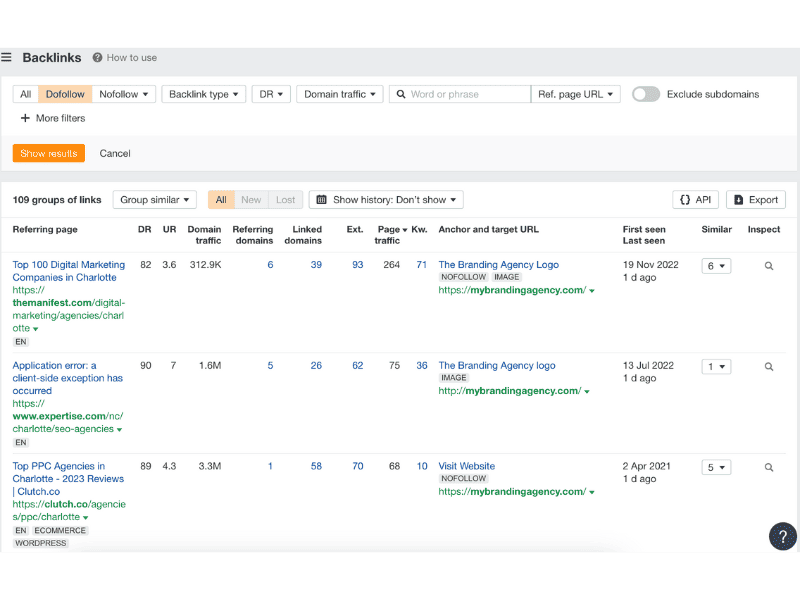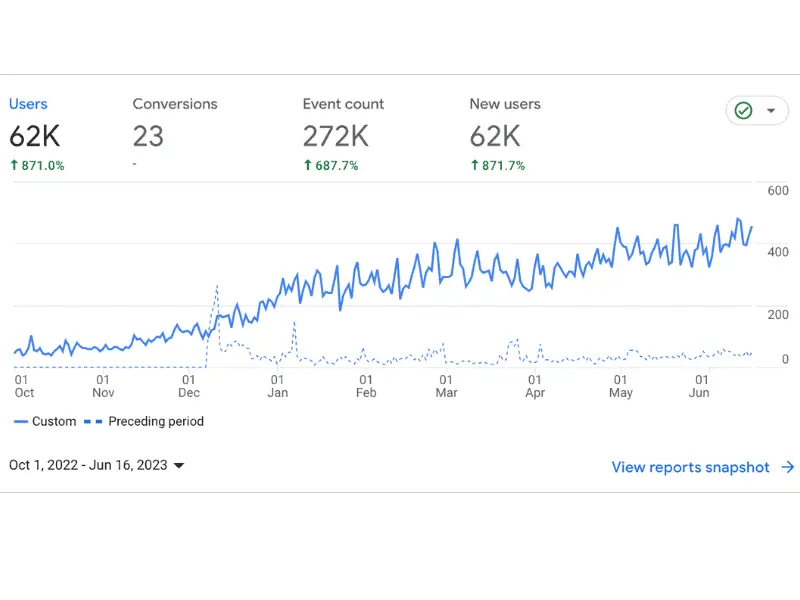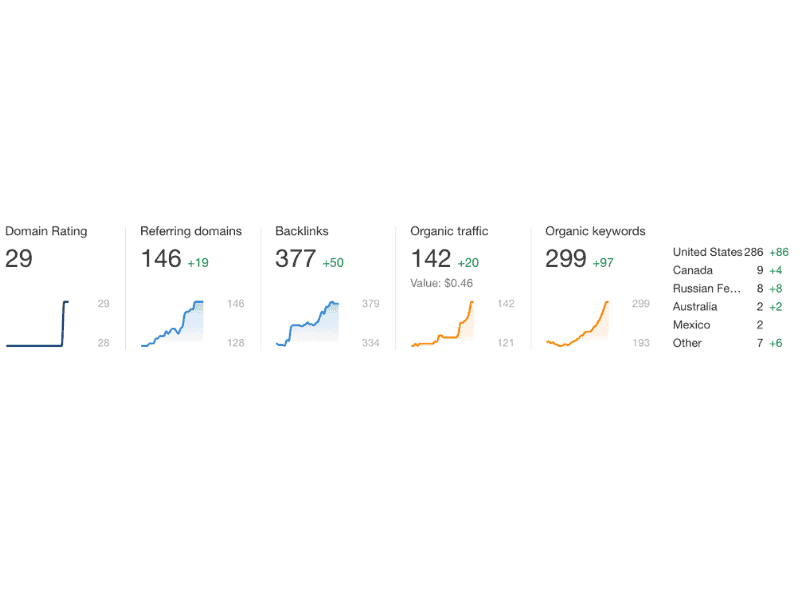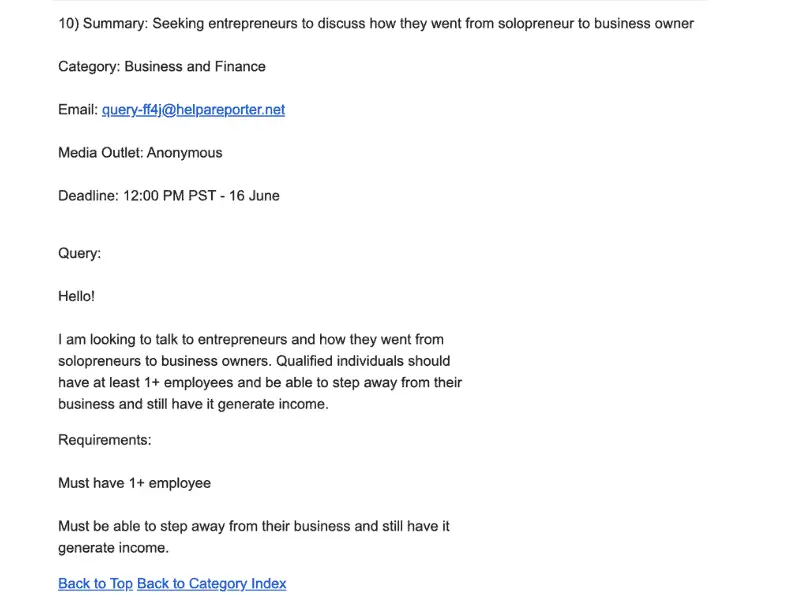In the world of search engine optimization (SEO), links and backlinks play a vital role in determining the visibility and ranking of your website. Understanding and leveraging these elements effectively can make a significant difference in your online presence. This comprehensive guide will delve into links and backlinks, explore their significance in SEO, and provide you with actionable strategies to build high-quality backlinks. Let’s begin by understanding the basics.
What Are Links and Backlinks: A Comprehensive Guide to SEO
Links are the fundamental building blocks of the internet, playing a crucial role in connecting web pages. In the realm of SEO, links serve as a vote of confidence for your website’s authority and relevance. When search engines crawl your site, they carefully analyze the links pointing to your pages, treating them as endorsements from other websites. The quality and relevance of these links directly impact your chances of achieving a high ranking in search results.
Understanding the concept of links is essential for any SEO practitioner. A link, or a backlink, is a clickable element on a webpage that directs users to another webpage or resource. It acts as a bridge between different online destinations, guiding visitors from one page to another. Search engines like Google place significant importance on links, considering them indicators of a website’s popularity, trustworthiness, and overall user value.
The significance of links in SEO cannot be overstated. They play a crucial role in determining your website’s page authority and ranking potential. When reputable and relevant websites link to your pages, search engines signal that your content is valuable and trustworthy. These endorsements, known as backlinks, act as a vote of confidence and can significantly boost your website’s visibility in search results.
To better understand the role of backlinks, consider the following examples. You’ve written a comprehensive blog post on a specific topic within your niche. If other influential blogs or websites in your industry link to your post, it drives direct traffic and signals to search engines that your content is worthy of recognition. As a result, your blog post gains more authority and stands a higher chance of ranking well in relevant search queries.
Monitoring backlinks is a critical aspect of SEO. By keeping track of the links pointing to your site, you can assess the quality, relevance, and effectiveness of your backlink profile. Various tools and software, such as Ahrefs and SEMrush, offer backlink analytics and monitoring capabilities, enabling you to identify the sources of your backlinks, analyze anchor text, and evaluate the overall impact on your search traffic.
Building a strong and diverse backlink profile requires strategic link-building efforts. There are various techniques and strategies you can employ to acquire high-quality backlinks. These include guest posting on reputable sites, reaching out to industry influencers and thought leaders for collaborations or interviews, creating valuable marketing content that naturally attracts links, and leveraging broken link opportunities on relevant websites.
It’s important to note that not all links hold equal value in the eyes of search engines. Search engines prioritize links from authoritative domains that have established credibility and trust. Nofollow links, which do not pass link equity, also have a role to play, particularly in diversifying your backlink profile and driving referral traffic.
To build and manage your backlinks effectively, consider utilizing helpful resources such as WordPress plugins, tutorials, and online tools. Many SEO software tools offer comprehensive backlink checkers, allowing you to track and analyze your site’s backlink profile, identify potential issues, and discover new opportunities for improvement.
✅ Links and backlinks are essential components of SEO and significantly impact your website’s visibility in search results. Understanding how links work, monitoring your backlink profile, and implementing effective link-building strategies are crucial to enhancing your website’s authority, driving organic traffic, and achieving success in digital marketing.
Understanding the Importance of Links in SEO
 When it comes to SEO, acquiring high-quality links from authoritative sources is essential. These links act as endorsements, demonstrating to search engines that your website is reputable and worthy of attention. Incorporating effective link-building strategies can enhance your website’s visibility in Google searches and improve its organic search rankings.
When it comes to SEO, acquiring high-quality links from authoritative sources is essential. These links act as endorsements, demonstrating to search engines that your website is reputable and worthy of attention. Incorporating effective link-building strategies can enhance your website’s visibility in Google searches and improve its organic search rankings.
Let’s delve deeper into links and explore their significance in SEO. Here are some key aspects to consider:
1. Differentiating Between Links, Backlinks, and External Links
– Links: In the realm of SEO, links refer to clickable elements that connect one webpage to another, whether within your website (internal links) or external websites (external links).
– Backlinks: Also known as inbound links or incoming links, backlinks are external links that point to your website. They are crucial for SEO and contribute to your website’s authority and credibility.
– External Links: These links direct users from your website to other external websites. When used strategically, they can provide additional value to your content and enhance the user experience.
2. The Role of Links in SEO and Organic Search Rankings
– Search Engine Confidence: Links act as a vote of confidence for search engines. When authoritative websites link to your content, search engines perceive it as a sign of trust and credibility.
– Improved Visibility: High-quality backlinks can increase your website’s visibility in search engine results pages (SERPs), driving more organic search traffic.
– Page Authority: Links contribute to the overall authority of a webpage. Websites with a higher number of quality backlinks tend to have better page authority, leading to higher search rankings.
3. The Impact of Anchor Text and Contextual Relevance
– Anchor Text: The clickable text that is used as the hyperlink for a link is called anchor text. It plays a crucial role in determining the relevance and context of the link.
– Contextual Relevance: Links embedded within relevant and informative content hold more value. Search engines consider the context surrounding the link to determine its relevance to the content and topic.
4. Effective Link-Building Strategies and Examples
– Guest Blogging: Contributing high-quality articles to relevant websites in your industry can help you acquire valuable backlinks.
– Content Marketing: Creating engaging and informative content that naturally attracts links from other websites can significantly improve your link profile.
– Broken Link Building: Identifying broken links on authoritative websites and reaching out to them with a suggestion to replace the broken link with a link to your relevant content.
– Influencer Outreach: Collaborating with influencers and industry experts to create valuable content that earns backlinks and expands your online visibility.
✅ Understanding the importance of links in SEO is crucial for optimizing your website’s visibility, search rankings, and overall user experience. By implementing effective link-building strategies and acquiring high-quality backlinks, you can enhance your website’s authority, attract more organic search traffic, and establish a solid online presence.
Read about: Why do our search rankings drop on weekends?
The Role of Backlinks in Boosting Your Google Search Rankings
 Regarding SEO (Search Engine Optimization), backlinks are a critical factor in establishing the authority and relevance of your website. You can significantly improve your search engine rankings by acquiring more authoritative backlinks. This, in turn, generates more visibility for your pages and increases the chances of attracting valuable organic traffic.
Regarding SEO (Search Engine Optimization), backlinks are a critical factor in establishing the authority and relevance of your website. You can significantly improve your search engine rankings by acquiring more authoritative backlinks. This, in turn, generates more visibility for your pages and increases the chances of attracting valuable organic traffic.
Monitoring your backlinks and analyzing their impact on your website is essential. By using backlink analytics tools, you can gain insights into the quality and quantity of external links pointing to your site. These tools provide valuable information about the anchor text used, the referring domains, and the overall health of your backlink profile.
Google pays close attention to the relevance and authority of the websites linking to yours. Aim to obtain backlinks from reputable and relevant sources within your industry. This ensures that the search engine recognizes your website as a valuable resource and rewards you with higher rankings.
Link-building strategies can vary depending on your specific goals and target audience. Standard methods include guest blogging, broken link building, and outreach to relevant websites for collaborations and content partnerships. These techniques help you acquire quality backlinks and establish your website as an authoritative source within your industry.
In addition to boosting your search engine rankings, backlinks contribute to the overall marketing content of your website. They serve as pathways that guide users from other online platforms to your pages, increasing the chances of converting visitors into customers. By incorporating backlinks into your digital marketing strategy, you can effectively expand your online presence and drive more targeted traffic to your website.
Several online tools, such as Ahrefs and SEMrush, are available to manage your backlinks effectively. These tools offer comprehensive insights into your backlink profile, allowing you to track and monitor the performance of your external links. By regularly reviewing your backlink analytics, you can identify opportunities for improvement and refine your link-building strategies.
It’s worth noting that not all backlinks are equal. While “nofollow” links may not directly contribute to your search rankings, they still contribute to generating referral traffic and expanding your online visibility. Therefore, it’s essential to focus on acquiring a healthy mix of both “follow” and “nofollow” backlinks to maximize the benefits for your website.
Leveraging Backlinks for Increased Page Authority

Backlinks are vital to search engine optimization (SEO) and can significantly impact your page authority. When it comes to SEO backlinks, understanding their role and importance is crucial. By acquiring quality links from reputable websites, you can enhance the strength and credibility of your web pages.
Page authority revolves around the overall power and trustworthiness of a specific page on your website. When high-quality websites link to your pages, they pass on a portion of their authority, bolstering your page authority. As a result, your chances of ranking higher in search engine results pages (SERPs) and attracting organic traffic increase substantially.
To grasp the significance of backlinks in SEO, consider the following examples:
1. Improved Search Traffic: Backlinks can significantly boost your website’s visibility on search engines like Google. As authoritative websites link to your content, it signals to search engines that your page is trustworthy and relevant, leading to higher rankings and increased organic traffic.
2. Monitoring Backlinks: It is essential to monitor your backlinks regularly to ensure their quality and relevance. Utilize tools like Ahrefs, SEMrush, or Moz to analyze your backlink profile, identify potential issues, and make informed decisions to optimize your link-building strategies.
3. Anchor Text Optimization: Anchor text is vital in backlinking. Using descriptive and relevant anchor text can enhance the value and context of the backlink. This optimization technique helps search engines understand your page’s topic, further boosting your page authority.
4. Guest Blogging and Outreach: Guest blogging on reputable websites within your niche is an effective way to acquire quality backlinks. By providing valuable and informative content to their audience, you can earn backlinks to your website, improving your page authority. Outreach efforts to relevant websites can also result in backlinks and expand your online presence.
5. Broken Link Building: Another strategy to consider is broken link building. This technique involves identifying broken links on authoritative websites and contacting the site owners, suggesting your content as a replacement. If successful, you gain a valuable backlink while helping the website owner fix a broken link.
Creating high-quality, link-worthy content is essential to maximize the benefits of backlinks for your page authority. Engaging in content marketing, such as publishing blog posts, tutorials, or interviews, can attract natural backlinks from other websites. Additionally, leveraging social media platforms and email outreach can promote your content and encourage backlinking.
Remember that building backlinks should focus on quality rather than quantity. Having a few authoritative and relevant backlinks is better than numerous low-quality ones. Prioritize building relationships, delivering value to your audience, and creating unique content that naturally attracts backlinks.
By leveraging backlinks effectively, you can boost your page authority, enhance your website’s visibility, and attract more organic traffic. Take advantage of the available resources, tools, and strategies to develop a strong backlink profile contributes to your overall SEO efforts.
The Power of Anchor Text: Optimizing Your Links for SEO
Anchor text is the clickable and visible text within a link, which is pivotal in SEO. Search engines rely on anchor text to comprehend the context and relevance of the linked page. By strategically optimizing your anchor text with pertinent keywords, you can provide search engines with valuable insights about your content, enhancing your prospects of ranking well for specific search queries. It is essential, however, to maintain a natural balance and avoid over-optimization, as search engines may penalize websites for engaging in manipulative practices.
Understanding the Importance of Anchor Text
Anchor text, which is displayed in a link, holds significant weight in the world of SEO. Search engines utilize this text better to understand the content and context of the linked page. By carefully selecting and optimizing anchor text, you can provide search engines with additional information about your content and improve your chances of ranking higher in relevant search results. This optimization technique can significantly impact your website’s visibility, organic traffic, and overall SEO performance.
Optimizing Anchor Text for Enhanced SEO
To harness the power of anchor text and maximize its SEO potential, consider the following optimization strategies:
1. Relevant Keywords: Incorporate relevant keywords within your anchor text that accurately represent the linked page’s content. This helps search engines associate your content with specific search queries.
2. Contextual Relevance: Ensure the anchor text aligns naturally with the surrounding content. It should provide clear and meaningful information about the destination page to both search engines and users.
3. Diverse Anchor Text: Use various anchor text types, including exact-match, partial-match, branded, and generic variations. This diversification helps create a natural backlink profile and avoids the appearance of manipulation.
4. Link Placement: Position your anchor text within the appropriate context of the linking page. Placing it near relevant content enhances its relevance and improves search engines’ understanding of the relationship between the linked pages.
5. Internal and External Links: Optimize anchor text for internal and external links (within your website) and external links (leading to other websites). This optimization strategy enhances the overall SEO value of your website and promotes a healthy linking structure.
6. Linking to Authoritative Sources: When linking to external websites, prioritize reputable and authoritative sources. This enhances the credibility of your content and demonstrates your commitment to providing valuable information to your audience.
7. Natural Language: Strive for a natural and organic flow when crafting anchor text. Avoid excessive keyword stuffing or forced optimization, as search engines are increasingly adept at detecting manipulative practices.
Monitoring and Analyzing Anchor Text
To ensure the effectiveness of your anchor text optimization efforts, consider utilizing tools and resources that provide comprehensive backlink analytics. These tools help you monitor the quality and quantity of your backlinks, assess the page authority of linking sites, and evaluate the impact of anchor text on your search traffic. Examples of such tools include Ahrefs, Moz, SEMrush, and Google Search Console.
Incorporating anchor text optimization into your SEO strategy can profoundly impact your website’s visibility, search rankings, and overall digital marketing success. By following best practices, conducting thorough research, and staying up-to-date with industry trends, you can unlock the true potential of anchor text and propel your business forward in the competitive online landscape.
Understanding the Power of HARO: Leveraging Backlinks, SEO, and Page Authority for Effective Google Search Ranking

One highly effective method for acquiring quality backlinks is leveraging HARO (Help a Reporter Out), a powerful platform connecting journalists and reporters with expert sources. Register on HARO as a source by signing up here. By actively participating in HARO, you can seize valuable opportunities to contribute your expertise to articles and publications in your niche, thereby earning valuable backlinks to your website.
The benefits of utilizing HARO for link building and SEO are substantial. Firstly, the backlinks obtained through HARO typically originate from reputable and authoritative sources. These high-quality links signal to search engines that your website is trustworthy and relevant, thus positively impacting your search engine rankings.
Furthermore, HARO provides you with the advantage of obtaining backlinks with diverse anchor text variations. Anchor text refers to the clickable text that forms the link. Having a diverse range of anchor texts helps search engines understand the context and relevance of the linked content, further boosting your SEO efforts.
In addition to that, HARO presents an opportunity to earn backlinks from websites with high page authority. Page authority is a metric that evaluates the strength and credibility of a webpage. Acquiring backlinks from pages with high page authority can significantly enhance your own website’s authority and visibility.
By leveraging HARO effectively, you can tap into a vast network of journalists and reporters seeking expert opinions. This allows you to gain valuable exposure and provides an avenue for securing backlinks from high-ranking publications. The cumulative impact of these backlinks on your website’s SEO can be substantial.
✅ HARO is a powerful tool for acquiring backlinks, enhancing SEO efforts, and improving Google search rankings. By actively participating in HARO and securing backlinks from reputable sources with diverse anchor texts and high page authority, you can establish your website’s credibility and visibility in the competitive online landscape. To fully harness the power of HARO, monitor backlinks, analyze their impact, and continually refine your linking strategy to stay ahead in the ever-evolving world of digital marketing.
Steer Clear: Backlinks to Avoid in Your SEO Strategy
When it comes to backlinks, not all links are created equal. Some backlinks can do more harm than good to your SEO efforts. Understanding what backlinks to avoid is crucial for maintaining a solid online presence. Let’s review the different kinds of backlinks you should avoid protecting your website’s search engine rankings, page authority, and overall SEO health.
1. Low-Quality and Spammy Backlinks
One of the critical types of backlinks to avoid is low-quality and spammy links. These are typically obtained from irrelevant or suspicious websites with poor domain authority, containing spun content, or participating in black hat SEO practices. Search engines like Google can penalize your website if associated with such backlinks. Therefore, conducting regular link audits and disavow any harmful backlinks that may negatively impact your SEO efforts is crucial.
2. Paid and Manipulative Backlinks
Paid backlinks and manipulative link-building tactics are another category to steer clear of. Buying or exchanging links to artificially boost your website’s rankings violates search engine guidelines. These tactics include participating in link schemes, link farms, or private blog networks (PBNs). Search engines have become increasingly sophisticated in identifying such manipulative practices, and the penalties for engaging in them can be severe, leading to a significant drop in organic traffic and rankings.
3. Irrelevant and Unnatural Anchor Text
Anchor text is the clickable text within a hyperlink. Using irrelevant or unnatural anchor text in your backlinks can raise red flags for search engines. For example, excessively stuffing keywords or using generic phrases like “click here” as anchor text can harm your SEO efforts. Instead, focus on using descriptive and relevant anchor text that accurately represents the linked content and improves user experience.
4. Links from Link Farms and Link Directories
Links originating from link farms and link directories should be avoided. Link farms are networks of websites created solely to generate backlinks. These sites lack valuable content and exist solely to manipulate search engine rankings. Similarly, link directories are often filled with low-quality and irrelevant links. Obtaining backlinks from these sources can harm your website’s reputation and authority, so it’s best to focus on acquiring links from reputable and relevant websites instead.
5. Reciprocal Linking Schemes
Reciprocal linking schemes involve an agreement between two websites to exchange links. While some reciprocal linking can be natural and legitimate, excessive or indiscriminate reciprocal linking solely to manipulate search engine rankings can harm your SEO strategy. Instead, prioritize building organic, one-way backlinks earned through high-quality content and genuine relationships with other websites.
6. Hidden and Paid Links
Hidden and paid links are backlinks hidden from users or placed solely for search engine crawlers. These practices violate search engine guidelines and can result in penalties. Techniques like using tiny or invisible text, placing links within irrelevant elements, or manipulating CSS to hide links are considered deceptive and should be avoided. Similarly, paid links that are not properly disclosed can also harm your website’s credibility and rankings.
By steering clear of these backlinks and building a strong, diverse, and natural backlink profile, you can protect your website’s SEO health and improve its visibility in search engine rankings. Remember, quality
Mastering the Art of Links and Backlinks for SEO Success
In this comprehensive guide to links and backlinks in SEO, we have explored the importance of these elements in boosting your website’s visibility and search rankings. Links serve as a vote of confidence, indicating your site’s authority and relevance. Backlinks, in particular, are crucial in enhancing your Google search rankings and increasing your page authority.
By understanding the power of anchor text and optimizing your links with relevant keywords, you can provide search engines with valuable context and improve your chances of ranking for specific search queries. However, it’s essential to maintain a natural balance and avoid over-optimization to prevent any penalties from search engines.
When building high-quality backlinks for your Shopify store, creating compelling and shareable content, engaging in guest blogging and content partnerships, and actively reaching out to authoritative websites are effective strategies. Monitoring and analyzing your backlinks regularly and leveraging social media and online communities can also help you acquire valuable backlinks and increase your online visibility.
Remember, building backlinks is a continuous process that requires patience and persistence. It’s crucial to focus on acquiring high-quality links from reputable and relevant sources rather than pursuing quantity alone. By implementing the strategies outlined in this guide and consistently providing valuable content, you can strengthen your website’s authority, attract more organic traffic, and improve your online success.
Continuously educating yourself, leveraging available tools and resources, and adapting your strategies accordingly will empower you to successfully navigate the world of links and backlinks.
Start implementing these strategies today, and watch as your Shopify store gains higher search rankings, increased organic traffic, and greater online visibility. Remember, your links’ quality will ultimately propel your business forward in the competitive digital marketing landscape.


